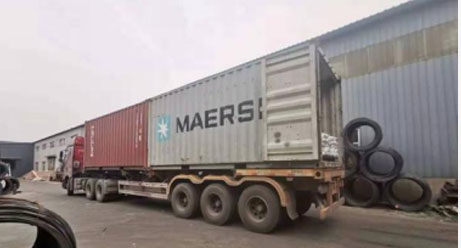

thick stainless washers
Dec . 11, 2024 11:42 Back to list
thick stainless washers
Understanding Thick Stainless Washers Their Importance and Applications
In the world of engineering and construction, every small component plays a significant role in ensuring the integrity and efficiency of a project. Among these components, thick stainless washers are often overlooked, but their importance cannot be overstated. These simple yet essential items serve as a critical interface in various applications, helping to distribute loads, prevent damage, and enhance the longevity of mechanical assemblies.
What Are Thick Stainless Washers?
Thick stainless washers are flat disks with a hole in the center, designed to be used in conjunction with bolts, nuts, and screws. The term thick refers to their increased thickness compared to standard washers, which provides added strength and durability. Typically made from stainless steel, these washers offer excellent resistance to corrosion, making them ideal for use in environments exposed to moisture, chemicals, or high temperatures.
Advantages of Using Thick Stainless Washers
1. Load Distribution One of the primary functions of thick washers is load distribution. When a bolt or screw is tightened, the force exerted can lead to localized stress on the material being fastened. Thick washers help spread this force over a larger area, reducing the risk of damage to the surface and ensuring a more secure connection.
2. Prevention of Damage In applications where soft materials, such as plastics or wood, are involved, using standard washers may not be adequate. Thick stainless washers provide a buffer that prevents the fastening element from deforming the material. This is especially relevant in cases where aesthetics or structural integrity is paramount.
3. Vibration Resistance Mechanical systems often experience vibrations during operation. Thick washers help maintain the integrity of the connection by providing a level of damping. This is crucial in preventing loosening over time, which can lead to catastrophic failures in critical applications.
4. Corrosion Resistance Stainless steel inherently resists rust and corrosion, making these washers suitable for outdoor and industrial environments. Their durability ensures that they retain their mechanical properties over time, even when exposed to harsh conditions.
Applications of Thick Stainless Washers
Thick stainless washers find applications in numerous fields, including
- Construction In building structures, these washers provide essential support for bolted joints, particularly in steel and concrete assemblies. They ensure that connections remain stable and resistant to environmental stressors.
thick stainless washers

- Automotive The automotive industry relies heavily on thick stainless washers in various assemblies, such as engine mounts and suspension systems. Their ability to withstand vibrations and resist wear is crucial for vehicle performance and safety.
- Manufacturing In manufacturing, thick stainless washers are used in machinery and equipment, where precision and reliability are essential. They help maintain the integrity of the assembly, contributing to overall efficiency.
- Aerospace The aerospace industry demands the highest standards of safety and performance. Thick stainless washers are used in various applications, from securing components to load-bearing assemblies, ensuring that every part functions optimally under extreme conditions.
Selecting the Right Thick Stainless Washer
When choosing thick stainless washers for a specific application, several factors should be considered
1. Dimensions It is vital to select washers with the correct diameter and thickness to match the corresponding bolts or screws. An improper fit can lead to inefficiency and potential failure.
2. Grade of Stainless Steel Different grades of stainless steel offer varying levels of strength and corrosion resistance. For instance, 304 stainless steel is commonly used for general purposes, while 316 stainless steel provides enhanced corrosion resistance, making it suitable for marine applications.
3. Load Requirements Consider the amount of load that the washer will be subjected to. Ensuring that the chosen washer can withstand the forces involved is critical for the reliability of the assembly.
4. Environmental Factors Evaluate the environmental conditions in which the washers will be used. If they will be exposed to harsh chemicals or extreme temperature variations, selecting a washer with the appropriate properties is essential.
Conclusion
Thick stainless washers may be small components, but their role in various applications is paramount. By ensuring load distribution, preventing damage, and providing corrosion resistance, they contribute significantly to the safety and efficiency of mechanical assemblies. Understanding their importance and selecting the right washers for specific needs can enhance the longevity and performance of structures and machinery alike. Whether in construction, automotive, manufacturing, or aerospace, thick stainless washers are indeed a vital element of modern engineering.
Latest news
-
High-Strength Hot Dip Galvanized Bolts - Hebei Longze | Corrosion Resistance, Customization
NewsJul.30,2025
-
Hot Dip Galvanized Bolts-Hebei Longze|Corrosion Resistance&High Strength
NewsJul.30,2025
-
High-Strength Hot-Dip Galvanized Bolts-Hebei Longze|Corrosion Resistance&High Strength
NewsJul.30,2025
-
Hot Dip Galvanized Bolts-Hebei Longze|Corrosion Resistance&High Strength
NewsJul.30,2025
-
Hot Dip Galvanized Bolts - Hebei Longze | Corrosion Resistance, High Strength
NewsJul.30,2025
-
High-Strength Hot Dip Galvanized Bolts-Hebei Longze|Corrosion Resistance, Grade 8.8
NewsJul.30,2025

